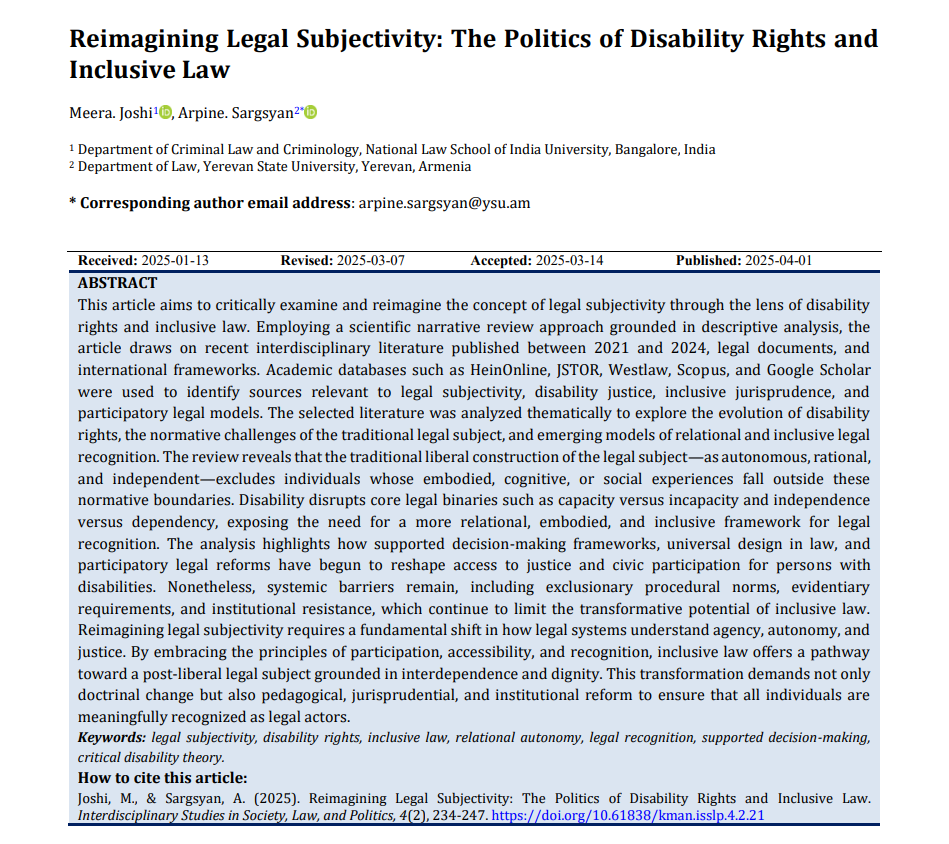Reimagining Legal Subjectivity: The Politics of Disability Rights and Inclusive Law
Keywords:
legal subjectivity, disability rights, inclusive law, relational autonomy, legal recognition, supported decision-making, critical disability theoryAbstract
This article aims to critically examine and reimagine the concept of legal subjectivity through the lens of disability rights and inclusive law. Employing a scientific narrative review approach grounded in descriptive analysis, the article draws on recent interdisciplinary literature published between 2021 and 2024, legal documents, and international frameworks. Academic databases such as HeinOnline, JSTOR, Westlaw, Scopus, and Google Scholar were used to identify sources relevant to legal subjectivity, disability justice, inclusive jurisprudence, and participatory legal models. The selected literature was analyzed thematically to explore the evolution of disability rights, the normative challenges of the traditional legal subject, and emerging models of relational and inclusive legal recognition. The review reveals that the traditional liberal construction of the legal subject—as autonomous, rational, and independent—excludes individuals whose embodied, cognitive, or social experiences fall outside these normative boundaries. Disability disrupts core legal binaries such as capacity versus incapacity and independence versus dependency, exposing the need for a more relational, embodied, and inclusive framework for legal recognition. The analysis highlights how supported decision-making frameworks, universal design in law, and participatory legal reforms have begun to reshape access to justice and civic participation for persons with disabilities. Nonetheless, systemic barriers remain, including exclusionary procedural norms, evidentiary requirements, and institutional resistance, which continue to limit the transformative potential of inclusive law. Reimagining legal subjectivity requires a fundamental shift in how legal systems understand agency, autonomy, and justice. By embracing the principles of participation, accessibility, and recognition, inclusive law offers a pathway toward a post-liberal legal subject grounded in interdependence and dignity. This transformation demands not only doctrinal change but also pedagogical, jurisprudential, and institutional reform to ensure that all individuals are meaningfully recognized as legal actors.
Downloads
References
Bagnara, J. (2023). Reimagining Settler Law: Navigating the Lawscape on Wurundjeri Country. 27(1). https://doi.org/10.14453/ltc.499
Bhawal, D. (2023). Politics and Differently Abled Persons in India in the 21st Century. Indian Journal of Research in Anthropology, 8(2), 107-111. https://doi.org/10.21088/ijra.2454.9118.8222.6
Fahlevi, R., & Rahman, B. (2024). Pemenuhan Hak Politik Warga Negara Oleh Komisi Pemilihan Umum (KPU) Kota Banjarmasin (Studi Kasus Penyandang Disabilitas). Academy of Education Journal, 15(1), 474-481. https://doi.org/10.47200/aoej.v15i1.2229
Gran, B., & Bryden, A. M. (2022). Disability Rights and Citizenship. 656-678. https://doi.org/10.1093/oxfordhb/9780190093167.013.45
Hermalia, P., Santoso, R., Khairuddin, K., Maimun, M., & Zaharah, R. (2024). The Role of West Lampung General Election Commission (Kpu) in Fulfilling the Political Rights of Persons With Disabilities From the Siyasah Tanfidziyah Perspective. Constitutional Law Society, 3(1), 61-72. https://doi.org/10.36448/cls.v3i1.63
Kramer, E., Dibley, T., & Tsaputra, A. (2022). Choosing From the Citizens’ Toolbox: Disability Activists as Political Candidates in Indonesia’s 2019 General Elections. Disability & Society, 39(1), 85-104. https://doi.org/10.1080/09687599.2022.2060800
Meekosha, H., & Soldatić, K. (2024). Human Rights and the Global South: The Case of Disability. https://doi.org/10.32920/27953244
Nasution, F. A., Situmorang, T. P., Fahreza, I., & Nasution, N. F. (2023). Strengthening the Accessibility of Persons With Disabilities Through Political Education in the 2024 General Election in Medan City. Abdimas Talenta Jurnal Pengabdian Kepada Masyarakat, 8(2), 1214-1220. https://doi.org/10.32734/abdimastalenta.v8i2.13697
Oktarina, S. (2022). Dipilih Dan Memilih, Kesetaran Politik Bagi Kelompok Penyandang Disabilitas Pada Pemilu Demokrasi Di Sumatera Barat. Pepatudzu Media Pendidikan Dan Sosial Kemasyarakatan, 18(2), 80. https://doi.org/10.35329/fkip.v18i2.3739
Pane, E., & Yanis, T. Z. A. (2023). Affirmative Policy a Necessity for Fulfilling the Political Rights of Persons With Disabilities. Constitutionale, 4(2), 147-158. https://doi.org/10.25041/constitutionale.v4i2.3164
Polin, F. M. (2024). Perlindungan Hukum Terhadap Hak Politik Penyandang Disabilitas Dalam Pemeilihan Umum Presiden. Ganaya Jurnal Ilmu Sosial Dan Humaniora, 7(1), 262-272. https://doi.org/10.37329/ganaya.v7i1.3121
Pratama, A. B. (2024). Fulfillment of Constitutional Rights of People With Mental Disabilities in General Elections in the Batang Regency. Asian Journal of Law and Humanity, 4(2), 29-49. https://doi.org/10.28918/ajlh.v4i2.2
Pratiwi, W., Fitri, S. N., Fernando, Z. J., & Barkhuizen, J. (2023). Evaluation of the Fulfillment of Political Rights for Persons With Disabilities to Welcome the 2024 General Election. Volksgeist Jurnal Ilmu Hukum Dan Konstitusi, 19-32. https://doi.org/10.24090/volksgeist.v6i1.7886
Razak, A. (2023). Affirmative Action Untuk Penyandang Disabilitas: Memenuhi Hak Pilih Dalam Pemilu Yang Adil. Wajah Hukum, 7(2), 407. https://doi.org/10.33087/wjh.v7i2.1271
Soldatić, K., & Grech, S. (2024). Transnationalising Disability Studies: Rights, Justice and Impairment. https://doi.org/10.32920/27953835
Taupiqqurrahman, T. (2024). Advocating for Disability Voting Rights in Framework Ius Constituendum. Pena Justisia Media Komunikasi Dan Kajian Hukum, 23(1), 909. https://doi.org/10.31941/pj.v23i1.3767
Waltz, M. (2021). Commentary on “Political Engagement in the 2019 UK General Election of Patients With Autism and/or a Learning Disability Detained in a Psychiatric Hospital”. Tizard Learning Disability Review, 26(2), 87-89. https://doi.org/10.1108/tldr-12-2020-0038
Widya, F., & Wahyuni, S. (2024). Do People With Disabilities Have Rights in the Political Arena? A Legal Study on Disability Rights. E3s Web of Conferences, 593, 11001. https://doi.org/10.1051/e3sconf/202459311001

Downloads
Additional Files
Published
Submitted
Revised
Accepted
Issue
Section
License

This work is licensed under a Creative Commons Attribution-NonCommercial 4.0 International License.





